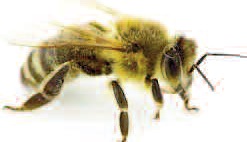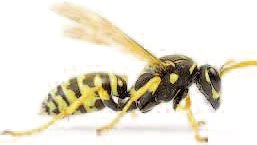SCORES & OUTDOORS: Bees and wasps – stinging insect activities continue into the fall
 SCORES & OUTDOORS
SCORES & OUTDOORS
by Roland D. Hallee
With the relatively dry summer we have experienced in 2017, you have probably noticed an increase in activity by bees and wasps over recent weeks. That is typical of a rainless period as bees are now out in search of moisture of any kind to continue their work at the respective hives.

Bee
Bees, wasps, and hornets – commonly referred to as “stinging insects” – continue to be active into the late summer and early autumn months in the northeast, despite the majority of nest and hive activity taking place earlier in the year. As a result, prevention techniques are still important for individuals and families looking to avoid painful stings.
“There are thousands of different species of bees, wasps, and hornets worldwide and as many as 200 that may be found in New England,” said Mike Peaslee, technical manager and associate certified entomologist at Modern Pest Services, a QualityPro company, recognized as such by the National Pest Management Association, serving Maine, New Hampshire, and Massachusetts. “They all have different functions and jobs within their own colonies so some are more active or prevalent than others as the days start to get cooler. But, as a whole, they are still around and still working hard, which can be problematic for people looking to avoid getting stung.”

Wasp
Among the reasons there may be stinging insect activity without any visible nest is because 70 percent of the 20,000 bee species actually nest underground. Wasps also have some ground-nesting species like Digger Wasps and Yellow Jackets. As the final days of summer draw near and the cooler days of autumn approach, sweet foods like loose, rotting apples on the ground can be a significant attractor of stinging insects to homeowners’ yards.
“People with apple trees or crab apple trees who don’t clean up loose fruit on the ground can see a bigger problem in their yard than others,” said Peaslee. “The insects will find a significant source of food and because the days are getting shorter, honeybees know they have to gather more food and nectar to feed their colony throughout the winter. That makes autumn a very important time of the year for these insects to prepare for the colder months.”
New England is home to several different types of bees and wasps, including Bald Faced Hornets, Carpenter Bees, Paper Wasps, and Cicada Killers.
“Distinguishing between a bee and a wasp is important, especially regarding control measures or nest removal, because they each require a specific treatment method,” said Peaslee. “Bees and wasps have a number of beneficial qualities to them, but they are also disruptive and dangerous for some people, which would require action to be taken on the nest.”
Bees stay in their hives throughout the winter while wasp and hornet nest will die off after the first hard frost with just the queens overwintering in protected sites in trees, structures, etc. before returning to activity in the spring, More information on bees, wasps, and other stinging insects can be found at www.modernpest.com.
These little creatures are not exactly my favorite. They can be nasty, unpredictable and take no prisoners, so to speak. I always refer to them as “underground terrorists.” Although they perform a needed service to the ecosystem, I don’t particularly care for their presence.
Responsible journalism is hard work!
It is also expensive!
If you enjoy reading The Town Line and the good news we bring you each week, would you consider a donation to help us continue the work we’re doing?
The Town Line is a 501(c)(3) nonprofit private foundation, and all donations are tax deductible under the Internal Revenue Service code.
To help, please visit our online donation page or mail a check payable to The Town Line, PO Box 89, South China, ME 04358. Your contribution is appreciated!


What animal digs them up and rips the combs apart?
Hi Jim,
Skunks and raccoons are responsible for digging up ground hives. They sniff out the hive at night and then dig them up for a feast. Bears are also known to do that. I hope that answers your question.
Roland